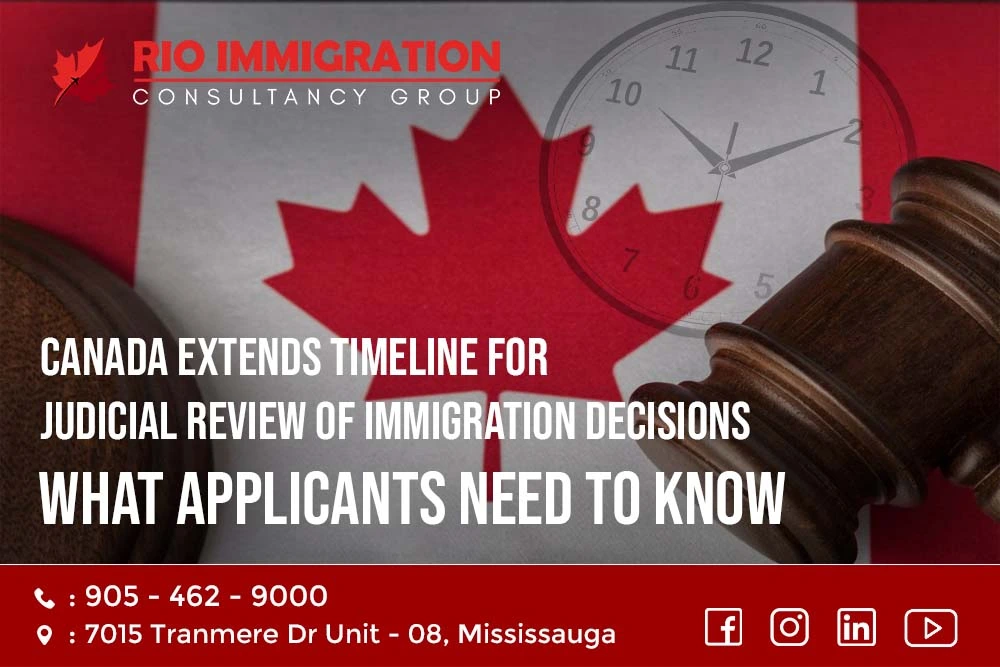
As immigration consultants dedicated to helping individuals navigate the complexities of Canada’s immigration system, we at Rio Immigration Consultancy Group are here to explain a significant update that may benefit applicants facing immigration refusals.The Federal Court of Canada adopted additional measures to extend the deadlines for judicial review applications on May 14, 2025. These changes aim to provide applicants with more time to respond to unfavourable decisions—especially in light of recent backlogs and rising legal complexity.
What Has Changed?
Prior to this, immigration applicants had only 30 days from the time they received a refusal decision to request judicial review. Under the new special measures, applicants now have an additional 45 days, giving them a total of 75 days to complete their judicial review application process.
This is a welcome change, as it allows more time to gather documents, consult legal or immigration experts, and prepare a strong case for review.
What is Judicial Review?
When a Canadian immigration decision is believed to be incorrect—whether due to an error in law, misunderstanding of facts, or failure to consider key information—applicants can request a judicial review by the Federal Court. This does not guarantee a reversal of the decision but opens a legal path for the case to be reviewed and potentially returned for reassessment.
The judicial review process is conducted in two key phases:
Leave Stage: The applicant requests permission (leave) from the court to have their case reviewed.
Judicial Review Stage: If leave is granted, the court will formally review the decision and may order a reconsideration.
Key Timelines and the Impact of the New Measures
As per the updated regulations, applicants now have seventy-five days to “perfect” their leave application, which entails providing the court with an application record in its entirety.
The 75-day period begins on one of the following dates:
The date on which the initial leave application is submitted;
The date written reasons for the decision are received (if they weren’t initially provided); or
The date notice is received confirming that no written reasons are available.
This extension is crucial for applicants, especially those dealing with complex documentation or requiring translation and legal assistance.
Step-by-Step Process for Judicial Review
To better understand the impact of this change, here is a breakdown of the steps involved in the judicial review process:
File the Application for Leave and Judicial Review
Applicants must file this application:Within 15 days if they are inside Canada.
Within 60 days if they are outside Canada.
Serve the Application and Provide Proof of Service
Once the application is filed, the applicant must serve it to the immigration authority and provide proof of service within 10 days.Respondent Files Notice of Appearance
The immigration authority (respondent) has 10 days to acknowledge participation in the case.Court Requests Written Reasons (If Not Provided)
If the original refusal didn’t include written reasons, the court will request them from the immigration tribunal.Tribunal Responds with Reasons or Notice
The tribunal must promptly share the written reasons—or formally state that none exist.Submit Applicant Record (Now Within 75 Days)
This is where the new extension is most helpful. Applicants now have 75 days (instead of 30) to submit their full applicant record, including documents and legal arguments.Respondent Submits Reply
After obtaining the applicant record, the respondent has 30 days to present their own supporting documentation and arguments.Optional Applicant Reply
If desired, applicants can respond to the respondent’s submissions within 10 days.Court Reviews Leave Application
The Court will then decide whether to grant leave. If denied, the case ends. If granted, a date for the judicial review hearing is set.
What Happens After the Hearing?
If the Federal Court finds that the decision was made fairly and in accordance with the law, the original outcome remains. However, if the Court identifies an error in the way the decision was made, it may send the case back to the immigration department for reconsideration. Note: This does not automatically guarantee a favourable outcome, but it offers a second chance.
We at Rio Immigration would like to conclude by saying that this extension to the judicial review application timeline is a positive development for immigration applicants in Canada. With more time to prepare, you can ensure that your case is presented thoroughly and fairly.
If you’ve received a refusal on your immigration application and believe an error was made, don’t hesitate to reach out to Rio Immigration Consultancy Group. Our experienced team is here to guide you through every stage of the judicial review process and advocate for your rights.


